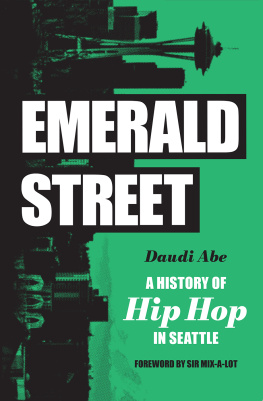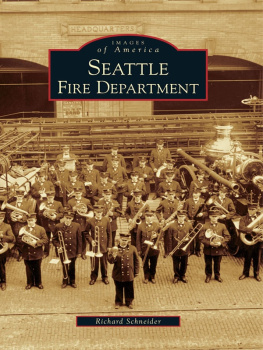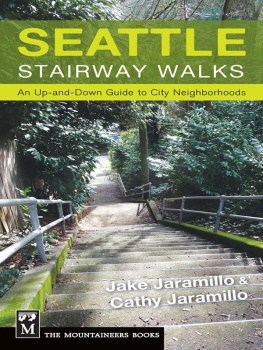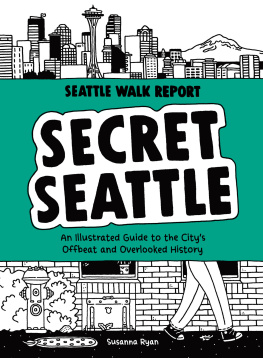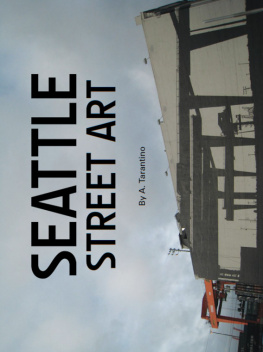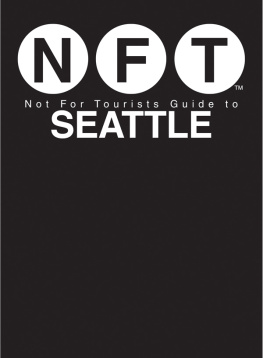Daudi Abe - Emerald Street: A History of Hip Hop in Seattle
Here you can read online Daudi Abe - Emerald Street: A History of Hip Hop in Seattle full text of the book (entire story) in english for free. Download pdf and epub, get meaning, cover and reviews about this ebook. year: 2020, publisher: U of Washington Press, genre: Non-fiction. Description of the work, (preface) as well as reviews are available. Best literature library LitArk.com created for fans of good reading and offers a wide selection of genres:
Romance novel
Science fiction
Adventure
Detective
Science
History
Home and family
Prose
Art
Politics
Computer
Non-fiction
Religion
Business
Children
Humor
Choose a favorite category and find really read worthwhile books. Enjoy immersion in the world of imagination, feel the emotions of the characters or learn something new for yourself, make an fascinating discovery.
- Book:Emerald Street: A History of Hip Hop in Seattle
- Author:
- Publisher:U of Washington Press
- Genre:
- Year:2020
- Rating:5 / 5
- Favourites:Add to favourites
- Your mark:
- 100
- 1
- 2
- 3
- 4
- 5
Emerald Street: A History of Hip Hop in Seattle: summary, description and annotation
We offer to read an annotation, description, summary or preface (depends on what the author of the book "Emerald Street: A History of Hip Hop in Seattle" wrote himself). If you haven't found the necessary information about the book — write in the comments, we will try to find it.
Daudi Abe: author's other books
Who wrote Emerald Street: A History of Hip Hop in Seattle? Find out the surname, the name of the author of the book and a list of all author's works by series.
Emerald Street: A History of Hip Hop in Seattle — read online for free the complete book (whole text) full work
Below is the text of the book, divided by pages. System saving the place of the last page read, allows you to conveniently read the book "Emerald Street: A History of Hip Hop in Seattle" online for free, without having to search again every time where you left off. Put a bookmark, and you can go to the page where you finished reading at any time.
Font size:
Interval:
Bookmark:

EMERALD STREET
EMERALD STREET
A History of Hip Hop in Seattle
DAUDI ABE
FOREWORD BY SIR MIX-A-LOT
UNIVERSITY OF WASHINGTON PRESS Seattle
Emerald Street was made possible in part by the Northwest Writers Fund, which promotes the work of some of the regions most talented nonfiction writers and was established through generous gifts from Linda and Peter Capell, Janet and John Creighton, Michael J. Repass, and other donors.
| This publication was also supported by a grant from the 4Culture Heritage Special Projects program. |
Additional support was provided by gifts from Krist and Darbury Novoseli and Michael T. Wing.
Copyright 2020 by Daudi Abe
Design by Thomas Eykemans
Composed in Bodoni*, typeface designed by indestructible type*;
Impact, typeface designed by Geoffrey Lee; and
Helvetica, typeface designed by Max Miedinger
Map by Ben Pease, Pease Press
24 23 22 21 205 4 3 2 1
Printed and bound in the United States of America
All rights reserved. No part of this publication may be reproduced or transmitted in any form or by any means, electronic or mechanical, including photocopy, recording, or any information storage or retrieval system, without permission in writing from the publisher.
UNIVERSITY OF WASHINGTON PRESS
uwapress.uw.edu
LIBRARY OF CONGRESS CATALOGING-IN-PUBLICATION DATA ON FILE
ISBN 978-0-295-74757-6 (hardcover)
ISBN 978-0-295-74756-9 (paperback)
ISBN 978-0-295-74783-5 (ebook)
The paper used in this publication is acid free and meets the minimum requirements of American National Standard for Information Sciences Permanence of Paper for Printed Library Materials, ansi z39.481984.
To my wife, Danielle;
my children, Dana, Leila, and Elijah;
my mother, Joan, and father, Ben;
my brother, Peter, and sister, Angela;
and the entire Abe and White families
Im the man they love to hate, the J. R. Ewing of Seattle
Seattle, the Central District, and the Arrival of Hip Hop
Seattle Hip Hop in the 1980s
Seattle Hip Hop in the 1990s
206/2k
Traditions Change and Continue
Back when Empire Way became MLK
Emerald Street: A History of Hip Hop in Seattle by Daudi Abe is a title that speaks directly to someone like me, since the legendary Emerald Street Boys were my first local inspiration. Their vocal delivery, sense of spacing and organization on stage, and professionalism were ahead of the curve and inspired me to take making music seriously. This book is the first detailed account of the rich history that is almost four decades of hip hop in Seattlea story I have had a unique view of for nearly the entire time. Dr. Abes thorough research and straightforward writing has created a well-rounded narrative that allows readers from anywhere to get a true sense of Seattle flavor.
What is Seattle flavor? The uniqueness of being yourself. During the early and mid-1980s there was so much local talk about who would be the first to make it from Seattle. In a lot of ways, at the time I think that carrot being out there pushed the entire scene to try new things. I was fortunate enough to have my music break into the mainstream by doing something different. Square Dance Rap and Posse on Broadway werent about New York or living the gangster life; they were about being from Seattle.
As hip hop continued to grow in Seattle, it wasnt just about rap. DJs from Seattle have gone on to produce for some of the biggest names in music. Massive Monkees from Beacon Hill are worldchampion breakers, and local graffiti artists have had their work shown in galleries. Over the years this community has continued to challenge and support the creative energy of its young people.
I am proud to have a place in Emerald Street. A big part of hip hop is representation, and I have always done my best to let people know where Im from. When my records first started selling, I had the opportunity to tour with legends like Public Enemy, NWA, and Ice-T; they constantly told me what a great place Seattle was. Performing live and in videos was a chance to highlight the city. Look at the Baby Got Back video and see all the gear with the names of local teams.
Things have definitely changed throughout the years. When I won the Grammy Award for Baby Got Back in 1993, that presentation was not a part of the televised ceremony. Since then, hip hop has become more of a cultural force, not only in the United States but around the world with Seattle a definite contributor the entire time. Locally, hip hop has remained connected to whats going on at home. From 206 Zulu to the Seattle Hip-Hop Summit Action Network (SHHSAN) to Pro Browns 2012 op-ed in the Seattle Times responding to a number of shootings in the citys South End, the consciousness of local hip hop has remained an important part of the scene.
In 2011, I literally handed a baton to Macklemore on stage at a show and told him to run with it. Man, did he ever! But so have many others. Although it was symbolic, he and I know that one person could never fully represent all of hip hop in Seattle. Although lots of people from the outside looked at Mack and me as overnight successes, both of our stories are rooted in the Seattle hip-hop experience, which, just like every other local scene, is unique. What the rest of the world suddenly heard was simply a product of all the people, places, sounds, and ideas that made up our environment.
Hip hops competitive spirit can get in the way of the cooperation that is necessary for any scene to thrive, and at times this was the case in Seattle. But its that same sense of competition that has pushed the culture to such incredible levels. Dr. Abe does a great job of capturing the details of local hip hop that contributed both to what worked and what did not. I love my hometown of Seattle, and after all of the history found in Emerald Street, I cant wait to see what we come up with next.
ANTHONY SIR MIX-A-LOT RAY
Auburn, Washington, USA
This project would not have been possible without the amazing assistance I received from numerous members of the community. Thank you all for making the effort and sharing your time, insights, expertise, and stories. Props and respect to the journalists and writers (whether cited here or not) who put in work covering the scene, and a special shout-out to anyone not mentioned enough or at allstill an important part of this great history.
These incredible people and organizations include: Anna Banana Freeze, Ante Up, Art Primo, BPC at Monroe, Roc Select-A-Roc Caldwell, James Captain Crunch Croone, Casey Carter and MissCaseyCarter.com, Cedric Prim, Colleen Ross, Damico Parker, Dan Satterberg, David Toledo, Derrick X (aka Silver Shadow D), Eric Professor E Davis, Guy DJ Uncle Guy and Chris Ferl Davis and Another Record Store, DeVon Manier, Draze, DV One, DVS, Earl Debnam, Fever One, Bob Fisher, Fleeta Partee, John Frostmaster Chill Funches, Funk Daddy, Gabriel Teodros, Jason Gavin, Georgio Brown, Ghetto Prez, Gifted Gab, Chul Gugich and 206UP, Heidi Jackson, Ish, Jace, Jazmyn Scott, J. Moore, Jake One, Jeromeskee, Julie C, Kelli Faryar, Erika Kylea White, Omari Tahir-Garrett, Kevin Gardner, Susan Giffin, King Khazm, Kun Luv and Seaspot, Larry Mizell Jr., Lisa Loud, Logic Amen, Mac Slug, Massive Monkees, Andrew Matson, Megan Jasper, Meli Darby, B-Mello, Mike Clark, the City of Seattle Office of the Mayor, MOHAI (the Museum of History and Industry), Charles Mudede, Nissim, Notework, Northwest African American Museum, Northwest Folklife Festival, Patrick Lagreid, Pablo D, Paul de Barros, Alison Pember, Prometheus Brown, Nasty Nes Rodriguez, Rachel Crick, Rell Be Free, Robert Newman, Georgia Roberts, Porter Ray, Ricardo Frazer, Sam Chesneau, Samson S, Sean Malik, the Seattle Police Department, Seattle Public Library, Sheila Locke, Shockmaster Glen Boyd, Simon Robinson, Sir Mix-A-Lot, Sista Hailstorm, Jeff Soul One Higashi, SPECSONE, Spin Nycon, Steve Sneed, Sub Pop Records, Edward Sugar Bear Wells, Supreme, The Station Caf, Third Andresen, Tony B, Topspin, Keith Tucker, Damisi Velasquez, Vitamin D, Vivian Phillips, Akil Washington, the University of Washington Hip Hop Student Association (UWHHSA), Aaron Walker-Loud, the Wing Luke Museum of the Asian Pacific American Experience, Inye Wokoma and Wa Na Wari, Kitty Wu, Wyking Garrett, Yirim Yiddim Seck, Zach Quillen, Zeb ESTEEM 1 Hill, and 206 Zulu.
Font size:
Interval:
Bookmark:
Similar books «Emerald Street: A History of Hip Hop in Seattle»
Look at similar books to Emerald Street: A History of Hip Hop in Seattle. We have selected literature similar in name and meaning in the hope of providing readers with more options to find new, interesting, not yet read works.
Discussion, reviews of the book Emerald Street: A History of Hip Hop in Seattle and just readers' own opinions. Leave your comments, write what you think about the work, its meaning or the main characters. Specify what exactly you liked and what you didn't like, and why you think so.

